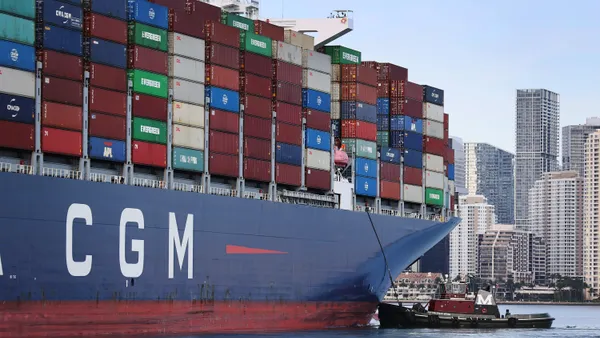Dive Brief:
- FedEx plans to convert its entire parcel pickup and delivery fleet to "zero-emission electric vehicles" by 2040, the carrier announced in a press release Wednesday.
- FedEx said it plans to replace its existing vehicles in phases. Half of all purchased FedEx Express vehicles will be electric by 2025, and all vehicle purchases are expected to be EVs by 2030.
- FedEx is investing $2 billion toward its plan to attain "carbon-neutral operations globally by 2040" and is focusing on sustainable energy, carbon sequestration (the permanent removal of carbon dioxide from the atmosphere), in addition to its switch to an all-electric parcel fleet.
Dive Insight:
The drive to sustainability among parcel carriers continues, as a way to cut costs and satisfy shipper demands for green operations. And the goal line is inching closer. UPS committed to alternative fuels supplying 40% of its ground needs by 2025, and FedEx has unveiled a strategy to reach its carbon-neutral benchmark by 2040.
Prioritizing EVs for FedEx's parcel fleet is one step in the plan. The carrier plans to reduce more aircraft fuel consumption, after already saving 1.43 billion gallons of jet fuel since 2012. Facility upgrades for energy efficiency and management, working with supply chain customers to provide carbon-neutral shipping and packaging, and helping to establish the Yale Center for Natural Carbon Capture, are also included in the plan.
Still, FedEx acknowledged more has to be done. "The long-term health of our industry is directly linked to the health of the planet, but this effort is about more than the bottom line – it’s the right thing to do," Chief Sustainability Officer Mitch Jackson of FedEx Corp said in a statement.
The long-term solutions parcel carriers have promised over the past years could be picking up steam due to customer demands. Supply chain professionals increasingly say sustainability in business operations translates into financial benefits.
"Making a social and environmental impact through your business has become table stakes, as consumers expect brands to take a stand on a growing number of topics material to their business and its long-term success," Danielle Jezienicki, director of sustainability at Grove Collaborative, said in UPS' August 2020 Sustainability Insights and Updates report.














